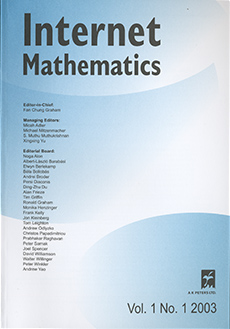Abstract
We consider the following game introduced by Chung, Graham, and Leighton. One player, $\mathbf A$, picks $k \gt 1$ secrets from a universe of $N$ possible secrets, and another player, $\mathbf B$, tries to gain as much information about this set as possible by asking binary questions $f : [N] \rightarrow \{0,1\}$. Upon receiving a question $f$, $\mathbf A$ adversarially chooses one of her $k$ secrets, and answers $f$ according to it.
In this paper we present an explicit set of $2^{O(k)}(\log N)$ questions, along with a \[ $2^{O(k^2)}(\log^2 N)$ \] recovery algorithm that achieves $\mathbf B$'s goal in this game. This, in particular, completely solves the problem for any constant number of secrets $k$.
Our strategy is based on the list decoding of Reed-Solomon codes, and it extends and generalizes ideas introduced by Alon, Guruswami, Kaufman, and Sudan.
Citation
Alexander A. Razborov. "Guessing More Secrets via List Decoding." Internet Math. 2 (1) 21 - 30, 2005.
Information




